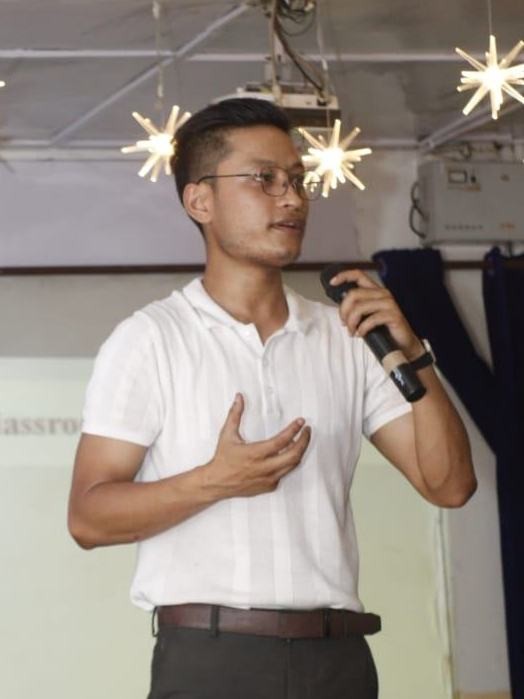Daewon Nongrem, Counselling Psychologist, Teacher and Life Skills Trainer addressing an Open Mic Mental Health event.

Vibi Yhokha Sophie
Kohima | May 29
Daewon Nongrem, a counseling psychologist, teacher and life skills trainer, has been developing his own model of addressing mental health concerns with an event called Open Mic Mental Health, and through social media platforms.
Currently working as a School Counselor and Psychology Teacher at Livingstone International Foundation School, Dimapur, he started his services online under the name Mental Health Mentor on social media platforms in 2019.
With his focus mostly on building awareness besides providing counseling services, the 27-year-old mental health professional noted that while there is no dearth of mental health professionals in the North-East, delivery of service was deficient.
He attributed the same to lack of awareness on the mental healthcare services available.
With his own model, he is currently on a mission to bridge the treatment gap.
Open Mic Mental Health
Open Mic Mental Health is an event developed by Nongrem, blending the concept of entertainment with education to build awareness on mental health services and addressing mental health concerns.
Since the first event at a small cafe in Darjeeling in 2019, he has had been travelling in various NE states and is currently based in Nagaland.
In each event, a particular theme is played alongside entertainment in any art form and mental health professionals in the local area are invited to share information and services available.
Participants are also invited to showcase their talents in any field of arts.
In Nagaland, he started the first Open Mic Mental Health in Kuda Café, Dimapur with “overwhelming response,” and the young psychologist followed it up by organising similar events in Kohima, Medziphema and Kiphire.
Held every month in local cafes, the main emphasis in each event is to sensitise participants and provide information on services available in one's local area on mental health.
Nongrem also conducted his first mental health outreach in Akuluto, Zunheboto.
Common mental health issues in Nagaland
Mostly working with young people, Nongrem who is originally from Meghalaya, viewed that most Nagas, especially in their 20s, are suffering from low self-esteem, anxiety and depression.
“Career wise, the self-esteem of the young is going down. Not having a clear vision of what next to do is a major setback,” opined Nongrem while pointing out that young Nagas equate success with government jobs or monetary wealth.
“This faulty perception of success is coming from what we practice in our society,” Nongrem added, appealing for changing the idea of success.
“I strongly believe that the educational institutions need to inculcate the idea of changing the mind of students that degrees are important but not the most important thing. You need to be skilled. That government jobs and big businesses are not the only way to earn money. There are multiple small skill businesses to earn one's livelihood,” he stressed.
However, this pattern is not specific to Nagaland alone. “This is a very common problem of today's time. Right now our generation is media driven generation. We wear, we want and desire for things based on what is on trend but nobody is talking about what we need, what is important for us and what will add value in our lives,” he rued.
Barriers to seeking help
“The strong fear of being judged and being called names hinders people to seek help,” stated Nongrem, pointing out that society labels everything, including giving derogatory names and words to people going through mental health issues.
This is embedded in our daily languages, he said.
With depression being a leading cause of death, Nongrem urged all stakeholders to be mental health allies. “It is on our shoulders to take the responsibility to build awareness. Asking for help is actually strength. All of us need to take responsibility to talk about mental health as often as possible,” he asserts.
Another concern related is the need to reach out to the older population who still has reservations on mental health.
While the young are open and perceptive to mental health, reaching out to parents is very crucial to normalise mental health issues.
One of the best ways to start this is at educational and religious institutions, he recommended.
“Intense work has to be done with the older generation. At the end of the day we all go home and if our views are not heard then it's difficult. We have to make this conversation as normal as possible,” he added.
He further announced that Mental Health mentor is bringing out an organisation that will bring about change in the system and organise large-scale events.
In September, Nongrem and a partner will be coming up with the first mega-event called Mental Health Fest in Dimapur. He is in the process of setting up an organisation for Mental Health Awareness and featuring the mental health services and professionals in the NE.






